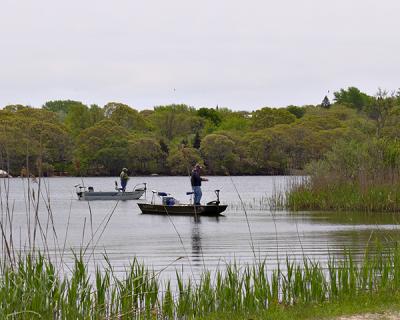The Mark of Cain

The die-off in Flanders of tens of thousands of bunker (menhaden) that peaked on Friday has been blamed on extremely low levels of oxygen in the Peconic Estuary due to an excess of nitrogen, which in turn brought on the “mahogany tide,” a dense brown algal bloom.
A month earlier, 100 diamondback turtles washed up dead in the Peconics after eating shellfish that contained the toxic algae. The nitrogen overload was caused, a Stony Brook University scientist said, by outflow from a sewage treatment plant in Riverhead.
Fish kills are relatively common and are not all related to man-made pollution. Bunker, an oily “industrial” species once processed en masse at the Promised Land plant, are a favorite prey of striped bass and bluefish. Schools of these predators often herd bunker into shallow water. As a result, the bunker that are spared the onslaught die because oxygen in the shallows is depleted during the fray. However, this particular incident bears the mark of Cain.
In Genesis, God marked Cain for killing his brother Abel. It was a warning to stop the killing of one’s fellow man. But why in the year 2015 do we continue to separate our species, in both a physical as well as an ethical sense, from other living things — hell, from all the resources of the earth? It’s like there are two plays being staged at the same time, the one in which elephants are being poached by the thousands for their ivory and oxygen-generating wilderness is razed in the name of climate-changing drilling, while on the other stage thousands of people die because one group believes in the holiness of the Prophet’s advisor, the other in the Prophet’s son-in-law, and a former Olympian changes from Cain to Mabel to wild applause.
Don’t get me wrong. I’m happy for Bruce — or I guess it’s Caitlyn now — for anyone who finds personal happiness any way they can without hurting others. But talk about fiddling while Rome burns.
I have now climbed down off my soapbox to report that the fluke fishing is about as good as it gets. I ran into Tommy Cusimano, captain of the Sea Wife IV at Goldberg’s deli in Montauk on Monday. As you will recall, Montauk was basically underwater on Monday, cold, with a wind-driven rain. It was well before noon, and he said he’d already taken a party fishing.
“There are some bass around, but the fluking is excellent. On Friday and Saturday it couldn’t have been better, a lot of 10-pounders.”
There are basically two types of saltwater fishermen, one that likes to hunt the bottom, the other that prefers hooking up mid-water or on the surface. The bottom is where fluke dwell, for the most part. I’ve actually seen them feeding on the surface off the east jetty of the Montauk Harbor inlet. If I’d had a rod I could have cast something that looked like a squid strip at them. That would have been one to remember, if I’d hooked up. If, if, if.
Speaking of which, by this time last year the leaderboard for the Montauk SurfMasters spring shootout posted a 52.12-pound striper caught by Matt McDermott, a 47.3-pounder that John Bruno hooked, and a 43.7-pound bass caught by Ben McCarron, all before the end of May.
But that doesn’t mean we are not experiencing some great striped bass fishing. Paul Apostolides of Paulie’s Tackle shop in Montauk reported “the best schoolie run in about five years.” He was referring to the run of smaller striped bass that surfcasters have been catching all along the south-facing beaches for the past several weeks.
I asked Captain Cusimano if he thought the bunker die-off in the Peconic Estuary could account for the relative absence of big bass in the area. He said he doubted it, at least here where the estuary empties into Block Island Sound.
But who knows? Nobody really knows, which I count as a good thing. During my two years working on a commercial fishing boat, the crew used to argue this question: If a fisherman of any stripe, sport or market, knew there was only one fish of a particular species left, would he try to catch it? There were four of us including the captain. It was a split decision, although I don’t remember the breakdown. In any case it’s an interesting question that pits tradition and instinct against reason.
On the one hand, you might reason that if there were only one left, you might as well catch it because it can’t reproduce. On the other hand, what if she were about to lay eggs?
The question remains.
